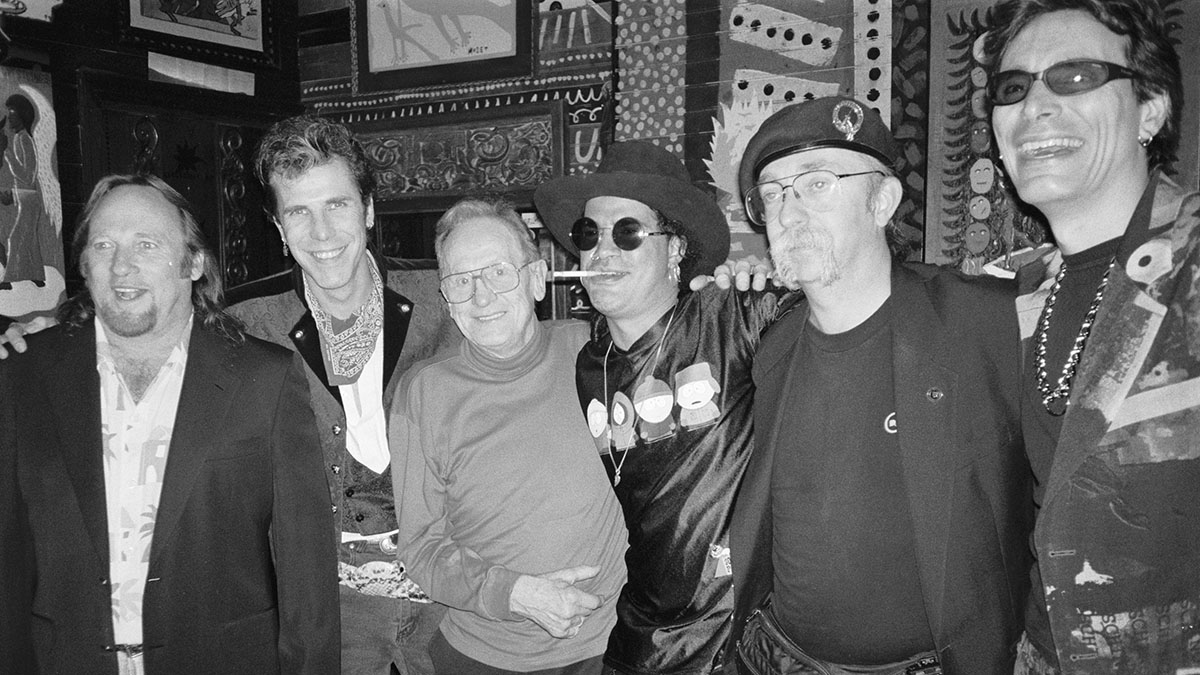Jeff “Skunk” Baxter looks back on his experience playing alongside Les Paul
The Steely Dan and Doobie Brothers legend on the man he describes as the “personification of excellence”
![[L-R] Jeff “Skunk” Baxter and Les Paul](https://cdn.mos.cms.futurecdn.net/EwGpUKsiFckuzw3S83UDuU.jpg)
“There are guitar owners, there are guitar players, and then there are guitarists. Les was a guitarist. The man was the personification of excellence,” Jeff “Skunk” Baxter says, with some authority.
A founding member of Steely Dan and a session ace with a list of credits any player would envy, Baxter is one of the most respected players in the world. Indeed, his solos on tracks such as Steely Dan’s Bodhisattva and My Old School gave the band a reputation for hot playing.
But just as thousands of aspiring guitarists have looked up to Baxter's guitar work, so Baxter has always held special regard for a master of an earlier generation: Les Paul.
“I first met him when I was 13 or 14,” Baxter recalls. “I was working at Dan Armstrong’s guitar shop on 48th Street in New York, and Les wandered in. Everybody eventually came to Danny’s shop because we were the only game – not just in town but pretty much anywhere – to get good custom electronics or for just customising your guitar.
“We met up occasionally after that. Then when I started to get more involved with Steely Dan, and The Doobie Brothers and stuff, there was a resurgence in interest in Les Paul, which was great.
He had his own style, and his style was very much connected to his ability to record
“There were times when I would actually play with him and he even asked me to play bass one time because he said nobody knew any of the songs [he wanted to play]. I was an old-school kid, playing out of fake books when I was 14, 15 years old, so I knew all the standards and could play that stuff.
“Finally, he would invite me to come down and play as much as I could whenever I was in New York. After that, we’d stay in touch on the phone. We’d talk and spend as much time together as we could. A lot of mutual respect there, which was very kind of him.”
Get The Pick Newsletter
All the latest guitar news, interviews, lessons, reviews, deals and more, direct to your inbox!
As a top-flight guitarist who played alongside Les frequently, Baxter is in a unique position to evaluate what was so unique about Les’s approach to playing.
“He had his own style, and his style was very much connected to his ability to record – and the technology that came along with it,” Baxter says. “If you’re using slap echo, the way you play leverages that effect and enhances your playing. Same with reverb, tremolo, anything that you do to affect the instrument. So Les’s style of playing was not only brilliant as a guitarist but also brilliant as a person who could ride that technology wave and use it to enhance his playing.”
Les’s fusion of virtuoso technique with elaborate recording techniques could occasionally catch out those who aspired to play like him, Jeff recalls ruefully.
“One time we were playing Lover, one of his famous tunes, and there was a part where it was very high up on the fretboard and really fast. When I was a kid, I practied that over and over again to get it right. When we did the gig, I played it and he was laughing his ass off.
I said, ‘Les, what’s up?’ He said, ‘I just want you to know, the part that you’re playing, I played it at half speed and sped it up!’ So I busted my ass to learn how to play it, which is fine. In fact, that was even better. Like, ‘Okay, that means I improved my technique and my capability as a player, thanks to Les…’”

But however much technology Les used, it was always in service to what was happening on the fretboard – never a gimmick nor a blind to cover a lack of ideas. The music that lay beneath even his most inventive studio techniques always overflowed with creativity and elan.
“The one thing I will always remember about Les was the joy of his playing,” Baxter reflects. “Every time we’d play, we’d spend half of our time laughing. There was just this joyous, wonderful… It’s hard to describe. It’s a nonverbal communication. I could play something, and Les would look at me and break out in laughter.
“That’s one of the things about his music that was so appealing to me – because, yes, there was a lot of technology, there was a lot of stuff for a human brain to decode, but, no matter what, the emotion and the joy always showed through all of that. And that is the mark of an incredible musician.”
Jamie Dickson is Editor-in-Chief of Guitarist magazine, Britain's best-selling and longest-running monthly for guitar players. He started his career at the Daily Telegraph in London, where his first assignment was interviewing blue-eyed soul legend Robert Palmer, going on to become a full-time author on music, writing for benchmark references such as 1001 Albums You Must Hear Before You Die and Dorling Kindersley's How To Play Guitar Step By Step. He joined Guitarist in 2011 and since then it has been his privilege to interview everyone from B.B. King to St. Vincent for Guitarist's readers, while sharing insights into scores of historic guitars, from Rory Gallagher's '61 Strat to the first Martin D-28 ever made.
“What blew me away was that everyone wanted the curly maple top. People were calling, saying, ‘I’ve got to have the bird inlays’”: Paul Reed Smith on raising the Standard 24, finally cracking the noise-free guitar and why John Sykes is a tone hero
“Among the most sought-after of all rhythm guitars… a power and projection unsurpassed by any other archtop”: Stromberg has made a long-awaited comeback, and we got our hands on its new Master 400 – a holy grail archtop with a price to match











